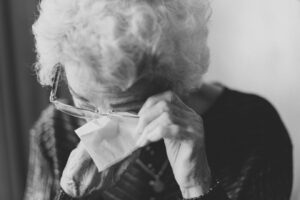Edited by Michele Filgate, What My Mother and I Don’t Talk About brings together fifteen writers who break the silence on their relationships with their mothers.
These essays shine the good, the bad, and the ugly about mother-child relationships.
As a daughter with a fraught relationship with her mother, I most resonated with the essays that expressed anguish and yearning for better mother-child relationships. One essay, in particular, had me swimming in a river of my own tears: “Her Body/My Body” by Nayomi Munaweera.
Nayomi’s mother has Borderline Personality Disorder and her behavior inhibited the family’s ability to achieve harmony. Nayomi also had to manage the duality of being a first-generation citizen to her Sri Lankan parents, the formidable dynamics of her parent’s arranged marriage which turned out to be toxic, and the mental health stigma often pervasive among South Asian families.
Despite all the obstacles and complications Nayomi experienced, she details that her saving grace has been her will to survive via strict boundaries. In her youth, boundaries took the form of disappearance (or dissociation). Later, her husband became the boundary because he was the first to show her what a healthy relationship was actually like and provided her the patience to fully internalize her new reality. Currently, her boundaries are more conventional in that she is purposeful with time spent and information shared with her parents. She has taken it upon herself to not fall victim to her upbringing but also to not be held back by the web of toxicity set out by her family.
She took her experiences, learned from them with support of professionals, and rewired her understanding of herself, family, relationships, love, and happiness. She stopped equating rage with affection. She stopped seeking validation from her parents. She stopped taking on the role of savior among her siblings.
Nayomi effectively broke her silence, thereby breaking the cycle and the stigma.
I highly recommend this book – as Filgate mentions in her introduction,
“We live in a society where we have holidays that assume a happy relationship… there is a huge swath of people who are reminded on Mother’s Day of what is lacking in their lives. For some, it’s the intense grief that comes with losing a mother too soon or never even knowing her. For others, it’s the realization that their mother, although alive, doesn’t know how to mother them.”
This quote alone speaks on the isolation so many children experience; and this book is like the motherly hug we all need.

Born & raised in Inglewood, CA, Angela combines her education and life experience of community inequity, family violence, and mental illness to de-stigmatize mental health.
-
TheHoodSocialWorkerhttps://psychosocial.media/author/thehoodsocialworker/June 12, 2019
-
TheHoodSocialWorkerhttps://psychosocial.media/author/thehoodsocialworker/June 25, 2019
-
TheHoodSocialWorkerhttps://psychosocial.media/author/thehoodsocialworker/July 17, 2019
-
TheHoodSocialWorkerhttps://psychosocial.media/author/thehoodsocialworker/August 29, 2019





















